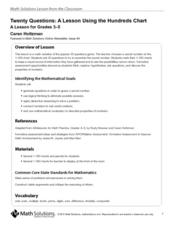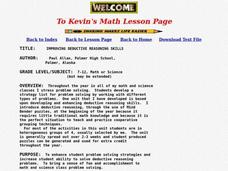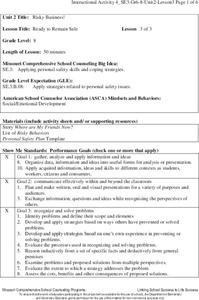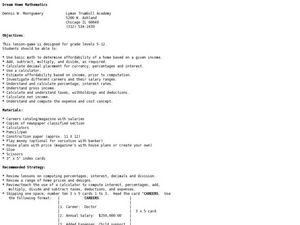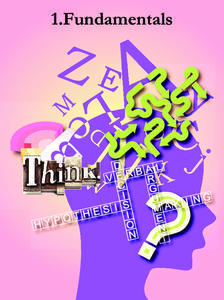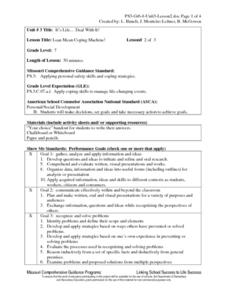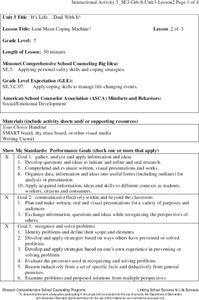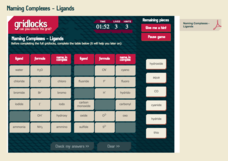Virginia Department of Education
Inductive and Deductive Reasoning
Introduce pupils to the two types of reasoning, inductive and deductive. Classmates work in pairs or small groups to learn the difference between the two and apply these reasonings to develop valid conclusions.
Curated OER
Inductive and Deductive Reasoning
Students use logical arguments and inductive reasoning to make or disprove conjectures. After observing a teacher led demonstration, students discover that the deductive process narrows facts to a few possible conclusions. In groups,...
Texas Education Agency (TEA)
Distinguishing Between Inductive and Deductive Reasoning (English III Reading)
Is Sherlock Holmes an inductivist or a deductivist? Users of this interactive to distinguish between inductive and deductive reasoning. They consider in various situations whether it is better to list evidence and then introduce a claim...
Curated OER
Improving Deductive Reasoning Skills
Students develop a strategy list for problem solving by working with different types of problems. They recognize problems that may be solved using deductive reasoning and solve deductive reasoning problems.
Curated OER
Organizational Strategies for First Year Composition Writers
Identify and analyze deductive reasoning through genuine texts. Compare cultural practices and beliefs about national ID cards. Look for another example of a deductive argument and prepare a brief paragraph analyzing the audience,...
K20 LEARN
Simply Elementary, Watson!
Explore the process of inductive and deductive reasoning. A collaborative lesson has some groups apply an inductive approach and others a deductive approach. Through class discussion, scholars compare their processes and discuss...
Curated OER
Twenty Questions: The Hundred Chart
Use the 20 Questions game to practice math vocabulary and number properties! Project a hundreds chart and hand one out to learners. Ideally, give them counters (beans would work well) to mark off the chart so you can play multiple times....
Curated OER
Jump-Start the Reading of Authentic Latin
Are your advanced learners reading authentic Latin this year? Whether you're teaching Caesar, Cicero or Virgil, use some of these strategies to map out your unit. What do you focus on? Consider taking small passages and making that the...
Curated OER
Improving Deductive Reasoning Skills
Students recognize problems that may be solved using deductive reasoning, and develop aids to help them in solving these problems. They produce their own deductive reasoning puzzles for other students to solve.
Mathematics Assessment Project
Deducting Relationships: Floodlight Shadows
Try to figure out what happens with shadows as a person moves between two light sources. A formative assessment lesson has individuals work on an assessment task based on similar triangles, then groups them based on their assessment...
Intel
Forensics: Get a Clue
Although the methods are all scientific, forensic science was started by police officers rather than scientists, who relied on observation and common sense. Young detectives use many tools to solve crimes around the school in a...
Curated OER
Problem Solving: Steps and Strategies
Learners explore the concept of problem solving strategies. In this problem solving strategies activity, students discuss methods for solving problems such as re-reading a problem, stating the facts, drawing a picture and so on. Learners...
Missouri Department of Elementary
Putting on Armor
Peers can exert tremendous pressure that can lead to positive and negative consequences. To conclude the Risky Business unit, class members create a Personal Safety Plan. They list things or situations that cause stress, things they have...
Curated OER
Dream Home Mathematics
Explore the concept of budgeting with sixth graders. They will pick a career on note card made by the teacher. They then use the information on the card such as salary, expenses, and career to create a life for themselves. They also...
Royal Society of Chemistry
pH and pOH
Feeling a little neutral about your pH and pOH teaching strategy? Perk it up with engaging puzzles! Young scientists relate ion concentration to pH and pOH, as well as the dissociation constant for water. The resource is available as an...
Royal Society of Chemistry
Significant Figures
Ready to add some innovation to your significant figures lesson? Pupils practice sig fig rules using a puzzle approach. Check out the Teacher's Area for printable materials, an answer key, and strategies for implementing the resource.
Education Bureau of Hong Kong
Fundamentals
"Fundamentals," the first lesson in a series of eight, introduces the basic concepts and strategies covered in a series of resources designed to teach high schoolers critical thinking skills. The worksheets and activities in this first...
Curated OER
Lean Mean Coping Machine!
Seventh graders apply coping skills to manage life-changing events. They plan and make written, oral and visual presentations for a variety of purposes and audiences, and then exchange information, questions and ideas while recognizing...
Curated OER
Logic
Students solve problems using reasoning techniques, identify the validity or non-validity of problems and use deductive reasoning for problem resolution.
Curated OER
Nim: A Game Played All Over the World
Pupils participate in a European subtraction game. In this subtraction lesson, students use pebbles to demonstrate different subtraction strategies. The pupils use a deduction strategy to be the first one left with no pebbles.
Curated OER
Proving Quadrilateral Properties
Working backwards can sometimes help you see a path to solving a problem. In this chapter, properites of quadrilaterials are proven by looking at flowcharts and working the probem backwards. Worked through examples are given, along with...
Missouri Department of Elementary
Lean Mean Coping Machine!
Seventh graders are asked to choose and rank five scenarios from a list of ten that are most important to them. After explaining the reasons for the choices, they then identify the coping skills they used to make their decisions.
Royal Society of Chemistry
Concentration of Solutions 2
Challenging and interactive—everything you need in a resource! Chemistry scholars manipulate a series of puzzles focused on molarity. The teacher's guide provides support for implementing the lesson, as well as printable materials.
Royal Society of Chemistry
Naming Complexes—Ligands
Naming complexes can be, well, pretty complex! Simplify a study of ligands using interactive puzzles. Junior chemists match up the name, formula, and complex name, then solve a series of logic games with the information.








